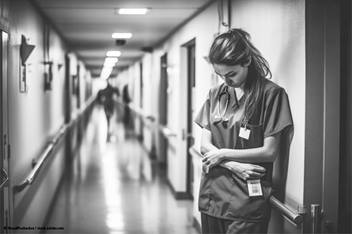Pregnancy: Issues and Answers
Today, you have been found to be pregnant. This handout will give you some basic information about what you may be feeling, your choices, and what you can expect from prenatal care (your health care before the baby is born).
Signs of Pregnancy
In early pregnancy, these things could happen:
-
Missing your menstrual period
-
Nausea (feeling queasy)
-
Breast tenderness
-
Tiredness
-
Going to the bathroom to urinate (pee) more often
You do not have to have all of these signs to be pregnant.
Next Steps
Here are some choices you can make for your pregnancy.
-
Parenting - You can continue the pregnancy with plans to parent the child yourself.
-
Adoption - You can continue the pregnancy while planning to give the baby to others who will adopt and parent the child. If you are thinking about this, your health care provider can refer you to an agency to help with the adoption of your baby.
-
Terminate pregnancy - You can choose to end the pregnancy (have an abortion). If you are thinking about this, it is important to know how many weeks you have been pregnant. This procedure is safest for you if you are less than 12 weeks pregnant. The cost of ending a pregnancy varies.
If you have decided to end the pregnancy, or would like more information about this option, you can call Planned Parenthood at 1-800-230-7526, or ask your health care provider about other local clinics. Note: in Ohio, if you are less than 18 years old
you will need your parent’s permission to have a procedure to end your pregnancy (an abortion). If you cannot get your parent’s permission, a judge may allow the procedure without it. Please talk with your health care provider about it.
This can be a very difficult time, with very hard choices to make. Feeling unsure of what to do is common, and normal. Talk about your thoughts and feelings with a trusted adult or your health care provider. It can help to talk to a professional counselor. Your health insurance may have a list of providers near you. Nationwide Children’s Hospital also has counselors and social workers who can talk to you. You can request an appointment online at www.NationwideChildrens.org or by calling (614) 355-8080.
Prenatal Care
Your health care before the baby is born is called prenatal care. There are many things to do while you are pregnant to make sure you and the baby are healthy.
Make an appointment with a prenatal health care provider. You should start your prenatal care during the first 12 weeks of your pregnancy. If you are past 12 weeks, please start your prenatal care as soon as you can.
If you do not already have a prenatal health care provider, Nationwide Children’s Hospital Adolescent Medicine Clinic offers the Teen and Pregnant (TaP) Program for prenatal care. Call the Teen and Pregnant Clinic at (614) 355-6350 to make an appointment.
At your first visit you will be asked questions about your medical history. You will be asked about the date of your last menstrual period. Your health care provider will do a physical exam.
During your pregnancy you will have tests to find your blood type, check for infection, diabetes and genetic conditions (health problems that might run in your family). If you
have a family history of any medical problems, you need to tell your health care provider.
Nutrition While Pregnant
-
It is important to eat a healthy and well-balanced diet during your pregnancy to help your baby to grow.
-
Many women have nausea (feeling queasy or like you want to vomit) during the first few months of their pregnancies. It is important to keep eating. Try eating smaller meals more often. This can help your stomach feel better.
-
It is normal to gain weight when you are pregnant. Most women gain about 25 to 35 pounds during pregnancy. Do not try to diet to lose weight during this time.
-
Start taking a prenatal vitamin every day as soon as you can. Continue taking it while you are pregnant. You can buy these vitamins at most drug stores, or your health care provider may give you a prescription for them.
Other Issues
-
Safety - Many women are at greater risk for violence or abuse during pregnancy. Tell your health care provider if you have any safety concerns. If at any time you do not feel safe at home, there are places you can go.
-
Huckleberry House is a safe place for pregnant teens ages 12 to 17. You can call Huckleberry House directly at 614-294-5553. You can also go to any Kroger, White Castle or a Fire Station and they will connect you with Huckleberry House.
-
You can call the national domestic violence hotline for help at 800-799-SAFE (7233) or call 911.
-
-
Drugs, Alcohol and Smoking - It is very important to not use any drug, smoke or drink any alcohol while you are pregnant. If you have a problem with the use of drugs, tobacco or alcohol, please discuss the issue with your health care provider.
-
Medicines - Many medicines are harmful if taken during your pregnancy. If you are taking medicines of any kind, please tell your health care provider.
-
First Time Mother - There is a free program called the Nurse-Family Partnership for low-income women who are pregnant for the first time. If you are in this program, a nurse will visit your home during your pregnancy and after birth until the baby is 2 years old. The nurse will help you with parenting skills, education, job training, and more. To find out if you can be in this program, call 614-722-8222.
When to Call Your Health Care Provider
Call your health care provider if you have:
-
A burning feeling when you urinate (pee)
-
Swelling of your hands or feet
-
Fever over 100.4 degrees Fahrenheit (taken under the tongue)
-
Bad headaches
-
Blurry vision
-
Bleeding from the vagina
-
Leakage of fluid (liquid) from your vagina
-
Abdominal (belly) pain or cramping
-
Decrease in the baby’s movements during the last 3 months of pregnancy.
-
Any other questions or concerns related to your pregnancy.
Pregnancy: Issues and Answers (PDF)
HH-IV-118 8/15 Copyright 2010-2012, Nationwide Children’s Hospital



